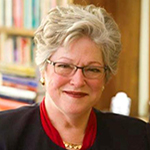By Molly T. Marshall
Follow Molly on Twitter @cbtskansas
 On the 50th anniversary of Martin Luther King Jr. receiving the Nobel Peace Prize, members of different faith communities gathered early at an urban church to pray and converse about the strained race relations in Kansas City. We well know that there are competing narratives beckoning for support as persons sort through recent tragic events.
On the 50th anniversary of Martin Luther King Jr. receiving the Nobel Peace Prize, members of different faith communities gathered early at an urban church to pray and converse about the strained race relations in Kansas City. We well know that there are competing narratives beckoning for support as persons sort through recent tragic events.
While many of us are encouraged to see persons of many hues involved in protesting systemic racism, we know that endemic structures resist transformation and that some things are seemingly “too broke to mend,” in the words of John Masefield. Where else shall we go but to the One who made heaven and earth and invites our participation in the great project of mending creation?
This is the third “pray-in” in our metro area; we are seeking to gather perspective for the labor-intensive work required to transform the social landscape. Different from a “die-in,” that symbolic act of futility in the face of violence, this gathering explicitly looks to God to resource and reconfigure our faltering efforts.
Too often we talk about prayer and never quite get around to doing it. We know that there are limits to words, even though we limp along offering the best we can as the homo loquens, the “speaking animal.” Silence in the face of atrocities seems callous; speaking risks trivialization.
In Kansas City, many community leaders have sought to respond to the events of Ferguson and New York City with spiritual sensitivity, realizing that moral leadership is indispensable for healing our land. The brutal and bewildering events of recent weeks — and enduring epochs — call us to deep prayer. Prayer evokes humility; it acknowledges that we cannot simply rely on our own devices to engage the seemingly intractable realities of the human condition.
The national conversation about race is using the explicit language of “white privilege,” and white persons are awakening to how we have benefited from the disparities that begin with skin color and then shape economic patterns and educational opportunity. White depravity remains inescapable, for we are all complicit in America’s original sin of slavery, and continuing repentance is essential.
Though white folks would rather brush this stained past aside as “ancient history,” it is incumbent for faith communities to recognize anew that their sanctioning allowed slavery to flourish. Confessing our participation in systemic evil, with black folks listening in, creates a new narrative for shared engagement.
We in the faith community ought to do what we know how to do: PRAY! It is our charism, and our time requires us to call upon God in urgent prayer. Our other methods have not been working so well, apparently. As poet Audre Lorde wrote, “The master’s tools cannot dismantle the master’s house,” so we pray in such a way as to open up space to forge creative new tools for transformation. As one speaker put it, we need to look “eye to eye to make sure one another is human.”
Many dismiss prayer as an excuse for passivity, a pious flight from concrete action. One pastor observed that the young men in her congregation were not too sure of the validity of prayer; they would rather take to the streets to enact change. Yet, as a communal exercise, it is a powerful tool for engaging the realities of the present horizon.
In his reflection, Rev. Dr. Wallace Hartsfield II offered the following insight about this irreplaceable spiritual practice: Prayer is about bringing the differing discourses, the narratival disparities, around tables for clarification, refining, and the discernment of truth. Discernment interrogates dominant narratives and welcomes voices too long silenced. Then some common prayers will arise.
Prayer does not end with discourse and discernment, however; demonstration follows, where we get up and live our prayers. We live into the reality that we have fashioned through listening to one another and discerning a new pattern of engagement. If transforming initiatives do not follow, we need to deepen our practice so that we pierce beneath the surface platitudes and allow holy Presence to prayerful demonstration of justice.
Walter Brueggemann has written, “If it cannot be said out loud, it cannot be redeemed.” As we spoke around the tables of our collective frustration about the “loop” of violence, the recurring of all too familiar events that decry human decency, we realized how important shared power is to dismantle the grave inequities spawned by racism. Our frank conversation encouraged us to consider that indeed we do have the resources to move beyond the fractured present.
We concluded our meeting by speaking of action steps, organizing arrangements, and public pursuits arising from our prayer. As a divine-human collaboration, our efforts require grace and the supply of the Spirit. We can be sure God will accompany every step toward justice and mercy.
